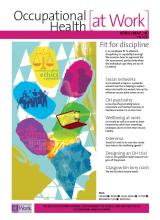April/May 2016 (vol. 12/6)
ContentsFeaturesNewsLegal
NewsResearch DigestResearch PlusCPD
Research Plus
Pre-employment examinations
Pre-employment health examinations (PEHEs) may be effective if they focus on the health risks of particular jobs, according to this updated Cochrane systematic review of 11 studies. But there is only low-quality and inconsistent evidence that they can reduce sickness absence or reduce work-related illness or injury as a result of either denying employment to the job applicant or mitigating job risks through workplace adjustments. There is: low-quality evidence that a general PEHE did not reduce sickness absence in non-hazardous light-duty work; very lowquality evidence that a job-specific PEHE of nursing staff, in which 6% of candidates were rejected, significantly reduced the number of musculoskeletal injuries; and inconsistent evidence that job-specific PEHEs reduced future musculoskeletal conditions compared to general PEHEs. There is low-quality evidence that including a histamine bronchial challenge test in a PEHE significantly reduced occupational asthma incidence among aluminium plant workers; but the applicant-rejection rate rose from 20% to 35% after the test was introduced. Workers given work restrictions or adjustments following a PEHE had similar injury rates over three years as those who did not need adjustments or restrictions (very low-quality evidence).
Cochrane Database of Systematic Reviews 2016;
1: CD008881. doi: 10.1002/14651858.CD008881.pub2.ohaw.co/1mZCBxQ
Occupational Health at Work April/May 2016 (vol. 12/6) pp39



